15 Things to Know Before Moving to Phoenix [2024]

Living in Phoenix comes with a healthy job market, low cost of living, and plenty to see and do year-round. Before you head to the Southwest, there's a few things you should know about moving to Phoenix.
We've compiled this list of what new Arizona residents should know about the area. Additionally, you can check out these great insights from YouTuber Kelly Cook:
Moving to Phoenix
1. Phoenix Is Probably Bigger Than You Think
Phoenix is the most populous city in the state and the fifth-most populous in the US. There are currently 1,680,992 people living in the metro area, including a diverse demographic with a robust Hispanic population. You can hear Spanish widely spoken, among other languages spoken by visitors from around the world.
The area was settled in 1867 near the Salt and Gila Rivers as an agricultural community. Its canal system led to economic growth and rapidly increased settlement. Phoenix experienced a population boom after the city built dams in the 1900s, and it eventually became a city known for manufacturing and electronics.
Despite being a desert, Phoenix still receives up to 15-inches of annual rainfall per year, making it one of the wettest deserts. The results of this rain are spring wildflowers, which create a unique desert backdrop. It's easy to see why "snowbirds" flock to Phoenix during the winter months, contributing to the 22-million visitors to the area.
Phoenix continues to draw urban lovers looking for an affordable cost of living. The metro area accounts for more than 80% of the state's recent population growth without any signs of slowing down.
2. Cost of Living in Phoenix Is Relatively Affordable
Living in Phoenix has a relatively low average cost of living for a major U.S. city. The cost of living in Phoenix is about 12% higher than the average U.S. city according to Apartment List's research, with the average Phoenix resident spending $5,108 a month living in the city.
In a living cost comparison, rent prices are more affordable in Phoenix than most metropolitan areas but will probably command most of your budget. The median rent in Phoenix rose to $1,336 overall. Like most urban areas, rents are rising again as pandemic conditions ease.
The median income in Phoenix is currently $60,914, as reported by the Census Bureau in 2020. By comparison, the median income is $61,529 in the rest of Arizona.
Those median income figures are different from the basic living wage. Living above the poverty threshold in Phoenix requires $15.41 an hour for a full-time employed single individual. You'll need a higher salary if you want to take advantage of recreational opportunities, nightlife, and the dining scene around Phoenix.
3. People Move to Phoenix from Other Big Cities
The population of Phoenix is quite diverse with a mix of college students, families, and retirees moving from various backgrounds. According to Apartment List's most recent migration report, the highest percentage of people moving to Phoenix are from Los Angeles, Chicago, or Tucson.
Renters who currently live in Phoenix are either considering moving or presently searching for apartments in Flagstaff, Tucson, Los Angeles.
Learn more about how to move to a new state, or check out this great list of other cities near Phoenix to consider.
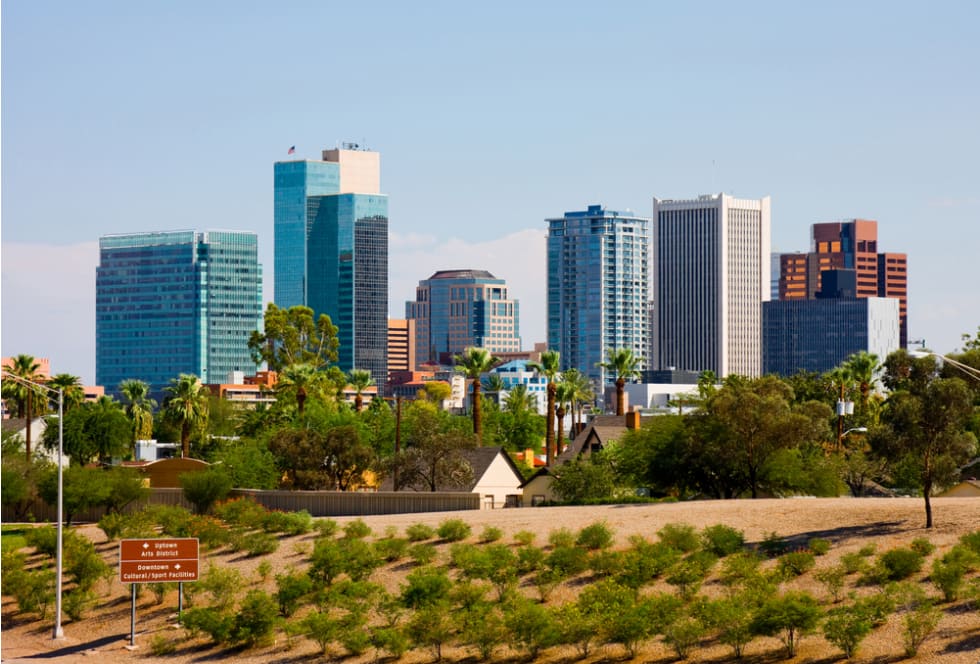
4. The Job Market Is on the Rise
Growth is on the rise in Phoenix thanks to the strong job market and economy. Commercial real estate investors are planning on aggressive investing in Phoenix, which signals that the local economy should grow within the next few years. Surveys show retail real estate investors ranked Phoenix as a Top 10 target among America's metros and jumped five spots to number 4.
Phoenix’s reputation as a developing tech hub is on the rise as well. The reasonable cost of living and warm climate could be appealing to techies relocating from San Francisco or Austin.
Beyond the tech sector, Phoenix has a robust financial industry. Some of Phoenix’s largest employers include Wells Fargo, Bank of America, and American Express.
5. Phoenix Is Known for It Hot, Dry Climate
Living in Arizona, you can expect hot weather.
Phoenix is known as the Valley of the Sun for a reason. Located in the Sonoran Desert, the warmest desert in North America, the summers get notoriously hot. Be prepared to increase your utility budget to accommodate Phoenix temperatures, which can soar past the 105-degree mark during the day. Swimming pools and central air conditioning are the norms around Phoenix.
Beyond the heat, there are seasonal monsoons and dust storms. You might hear locals talk about haboobs or intense dust storms that roll in like a weather front. If you hear of one coming, stay indoors and wait for it to pass.
6. Phoenix Has a Strong Car Culture
Like the rest of Arizona, Phoenix has a deep-rooted car culture. You need your own set of wheels to make the most of the city. You can also take advantage of Phoenix's "park-and-ride option" or drive to a Valley Metro public transportation station. Many locals hop on the light rail or bus system to beat the traffic, picking up their cars at the end of the day.
With some determination, it's possible to ditch the car with the help of the bus system, Uber, Lyft, bikes, or the Phoenix light rail. Fares run $64 for a monthly pass on a local bus and light rail. For an express pass or rapid pass, the cost rises to $104. Phoenix also offers short-term car rentals through companies like Zipcar.
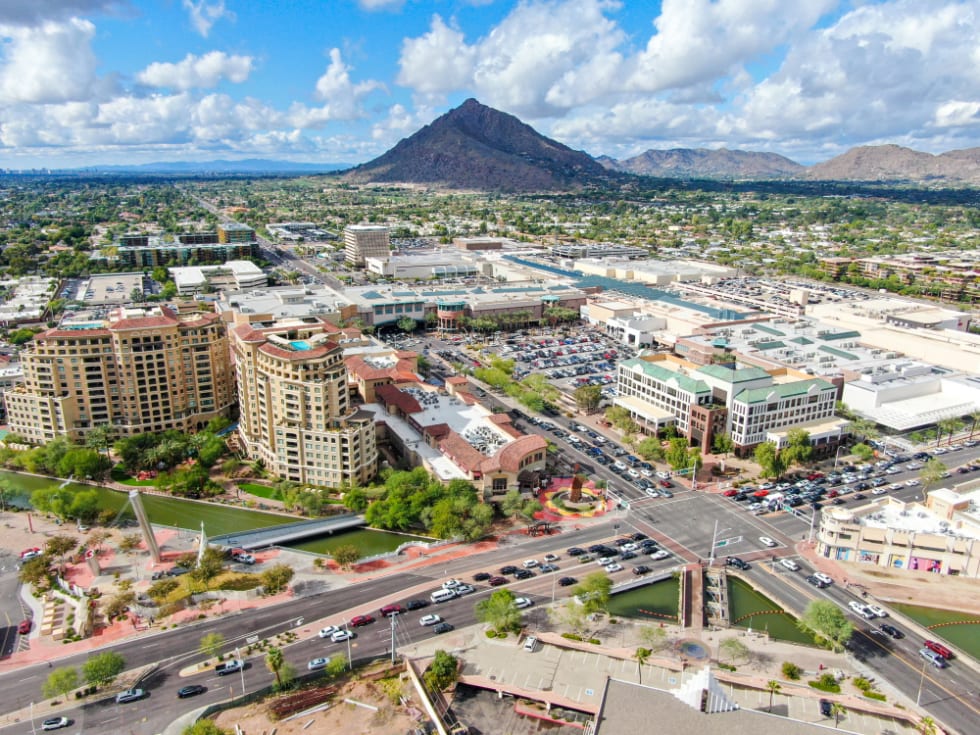
7. The Best Neighborhoods To Live In Phoenix
The best Phoenix neighborhoods are trendy, tranquil, and everything in between. Here are some of the most popular communities in Phoenix.
Downtown Phoenix
Downtown Phoenix is packed with restaurants, pubs, art, and culture. It's the perfect place to live, work, and play, where walking and biking is a viable alternative to driving.
Roosevelt Row Arts District
Creatives live in the Roosevelt Row Arts District in modern apartment complexes with top-tier amenities. Within the neighborhood, you’ll find lively bars and popular attractions, such as the Hard Museum of Native Cultures and Art.
Downtown Scottsdale
Downtown Scottsdale boasts 330 days of sun per year with a median temperature in the low 70s. Bike paths and horse trails are plentiful, as well as trendy restaurants and an artistic vibe. Scottsdale is also one of the safest places to live in Phoenix.
Central Phoenix
Central Phoenix or "CenPho" encompasses several neighborhoods spanning from Downtown to Uptown. The area skews towards upscale living with scenic neighborhoods and luxury apartment buildings.
Paradise Valley Village
Paradise Valley is known as the "jewel of the desert" and sits nestled between three mountain ranges. It's a quiet reprieve for commuters looking for more tranquility.
Encanto
Encanto features a historic vibe with urban living and has many retail shops sprinkled along the Park Central Mall area. It is also the perfect spot for LGBTQ-friendly nightlife.
Warehouse District
The Warehouse District was once home to horse-drawn wagons and historic buildings. Today, the area offers bars, restaurants, creative spaces, and Arizona State University's School of Art.
Learn more about the best neighborhoods in Phoenix here.
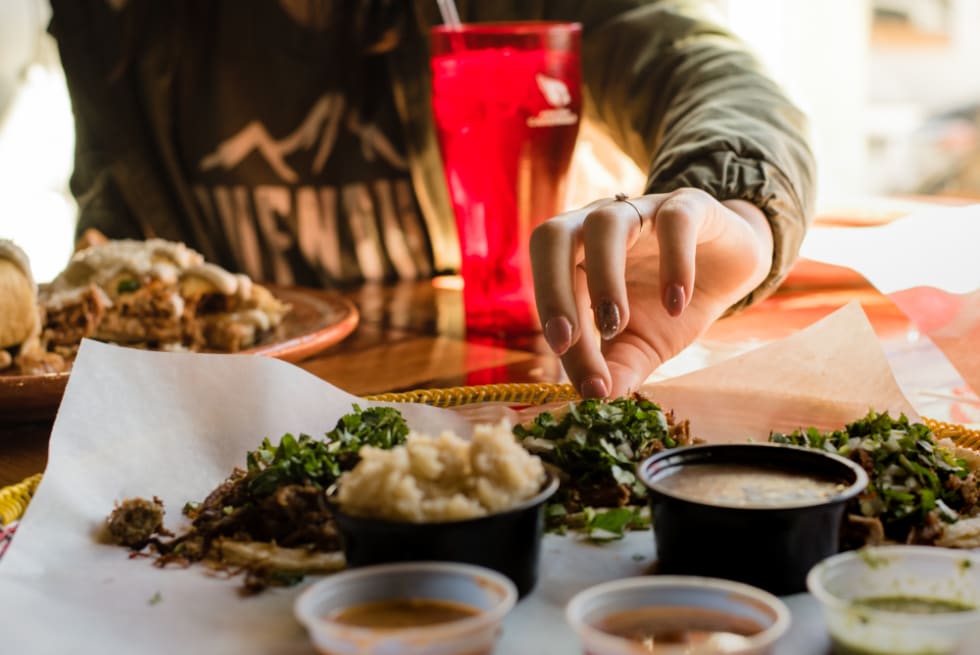
8. Best Things To Eat In Phoenix
The food and drink scene in Phoenix is renowned for its Southwestern, Mexican, and Native American-inspired cuisine. The city is full of award-winning restaurants and is a leader in the restaurant industry, leaving a positive impact on the food system and sustainability efforts.
You can make the most of Phoenix's culinary delights at the annual Devour Phoenix event. Phoenix foodies indulge in the valley's most sought-after restaurants, sample tantalizing dishes, and enjoy prix fixe menus.
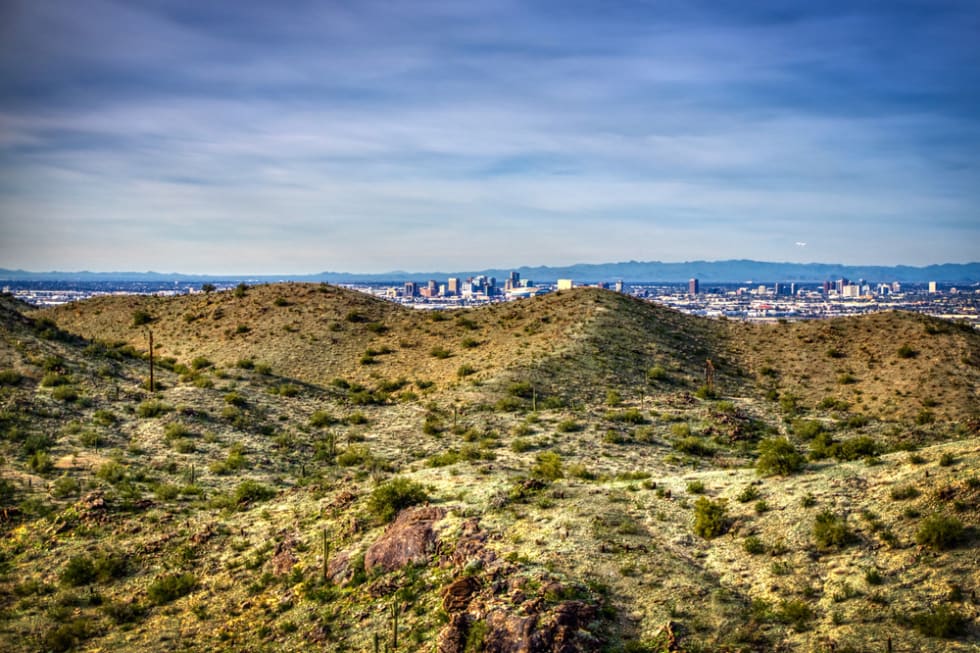
9. Phoenix Has Amazing Outdoor Recreation
Despite its reputation as a blistering hot town, Phoenix offers incredible outdoor recreation opportunities. Heading out in the morning, evening, or after summer winds down can help you beat the heat.
South Mountain Park and Preserve features over 16,000 acres and is one of the country’s largest municipal parks. On "Silent Sundays,” the park is closed to vehicle traffic at the one-mile mark so that residents can enjoy biking, walking, and hiking.
Papago Park offers views of red butte formations, including an iconic Hole-in-the-Rock trail. You can also fish in the lagoons, learn about indigenous tribes and their historic roots as a fish hatchery during the Great Depression.
Salt River is the largest tributary of the Gila River and spans 200 miles. The river flows over salt deposits, and locals enjoy tubing down the mountain-stream waters.
You can take in the vast Phoenix desert landscape in hot air balloon rides. Flights with companies like Rainbow Ryders last up to 3.5 hours, perfect for those looking to check off a ride on their bucket list.
Phoenix also draws locals and visitors alike year-round to its award-winning golfing. As of today, there are over 200 public golf courses in the metro Phoenix area.
10. Phoenix Is Fun After Dark
There's always something going on in Phoenix after dark. Expect to find curated cocktail lists, craft brewers, speakeasies, and bottle service in the city's trendiest neighborhoods.
For cocktails, try Bitter & Twisted Cocktail Parlour or the upscale speakeasy-style bar at Highball. A few of Phoenix’s best dive bars include Shady's Fine Ales & Cocktails, Sizzle Inn, and the Bikini Lounge.
Phoenix is the perfect town for beer lovers with spots like Helton Brewing Company, Wren House, and State 48. For nightclubs and live music, try Crescent Ballroom, The Churchill, or Culinary Dropout at the Yard.
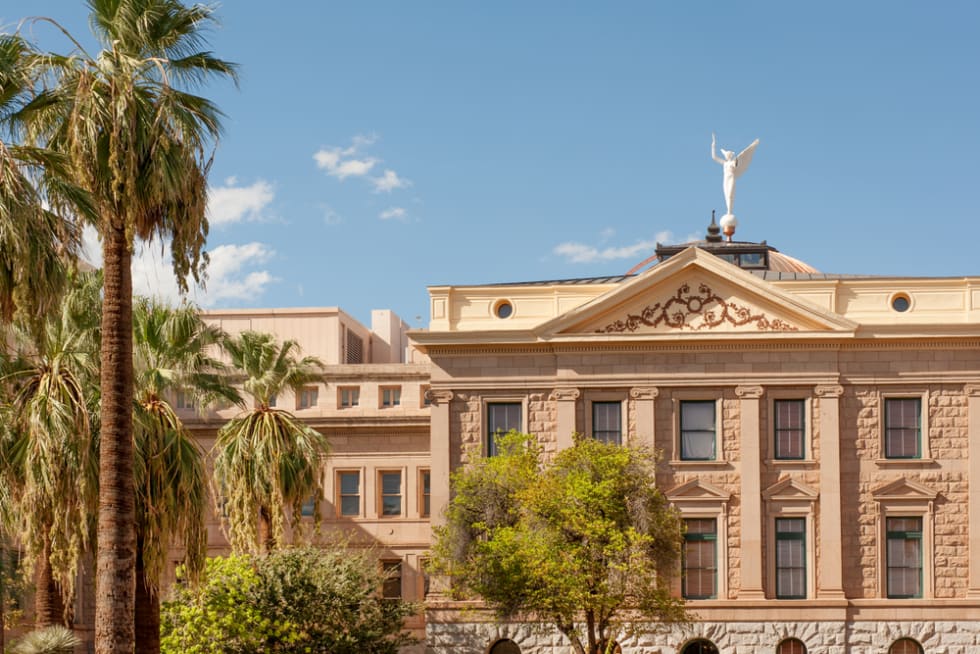
11. The Best Places To Explore In Phoenix
Phoenix is full of cultural opportunities. Take a trip to see the Arizona Opera Company or Ballet Arizona. Arts are on-demand around the city with places like the Phoenix Art Museum and the ASU Art Museum.
Pack a picnic of fresh olives, bread, and vinegar from the Queen Creek Olive Mill. Visit the Historic Arizona State Capitol museum and learn about Arizona's roots. If you’re feeling active, head out to some of Phoenix's outdoor adventures like Camelback Mountain or the Desert Botanical Gardens.
12. The Best Things to Do In Phoenix With The Family
Phoenix offers plenty of nightlife and culture for all ages but is also family-friendly. There are plenty of fun things to do in Phoenix with kids!
Plus, the cost of living makes hitting attractions like The Phoenix Zoo and Desert Botanical Gardens even more affordable. The Arizona Science Center offers hands-on exhibits for enriching learning and fun.
One unique place we highly recommend checking out is Butterfly Wonderland. This one-of-a-kind experience is both educational and whimsical, providing visitors with a deep knowledge of some of the world's most colorful butterflies. The OdySea Aquarium is the perfect spot for marine lovers looking to get up close and personal with the largest aquarium in the Southwest.
13. The Best Annual Events In Phoenix
Celebrate the best of Phoenix with festivals, cultural events, and live music. McDowell Mountain Music Festival attracts thousands to downtown Phoenix for a nonprofit music festival that gives back to the community.
The Phoenix Film Festival celebrates feature films over 11 days with 300 movies. Screenings take place at the Harkins Scottsdale 101 theater and showcase some of the industry’s best filmmakers.
Phoenix Flea is a modern market selling handcrafted and vintage items. You can also find art, fashion, design, and food at the market. Stop by and outfit your apartment or pick up a keepsake from your new city.
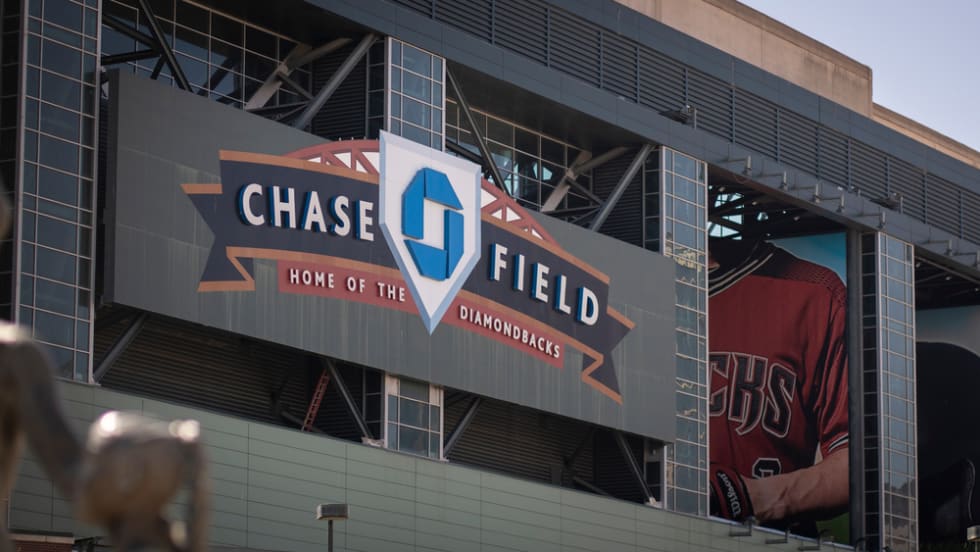
14. Phoenix Sports
Phoenix is a serious sports town with teams representing every franchise you can imagine. The Phoenix Suns (NBA) play at the Phoenix Suns Arena in downtown Phoenix, along with the Mercury (WNBA) and Arizona Rattlers (IFL).
The Arizona Cardinals (NFL) play at the State Farm Stadium, and the Arizona Coyotes (NHL) compete at the Gila River Arena.
Baseball fans enjoy the Arizona Diamondbacks (MLB) at Chase Field in downtown Phoenix. And Phoenix Rising FC (USL) delights spectators at their new home at Wild Horse Pass.
15. Colleges and Universities in Phoenix
Phoenix is a university town with plenty of options for higher education. Arizona State University, one of the top universities in Phoenix, AZ, is probably the most well-known. Although it has an excellent reputation for academics, it's also a party school that attracts newcomers to its campus.
Grand Canyon University and Phoenix College sit nearby for those looking to expand their horizons.
Looking for an Apartment in Phoenix?
Ready to move to Phoenix or Arizona and enjoy the best the Valley of the Sun has to offer? Learn about the cost of living in Arizona.
Sign-up for Apartment List, or simply start browsing our Phoenix apartment listings.
FAQs: What to Know Before Moving to Phoenix in 2022
What's the weather in Phoenix?
The weather in Arizona is hot, and Phoenix is no exception. The city is known as the Valley of the Sun and is located in the Sonoran Desert, which is the warmest desert in North America. It's normal for the heat to swell to 105-degrees in the summer. Beyond the heat, seasonal monsoons and dust storms are also part of Phoenix living.
What's the timezone in Phoenix?
Phoenix is located in Mountain Standard Time. When it is 1 pm in New York, it's 10 am in Phoenix.
What to do in Phoenix?
Phoenix is hot, but you can still get outdoors at the Desert Botanical Garden and Camelback Mountain. For culture, residents enjoy the Phoenix Art Museum, among the largest in the Southwest. Phoenix is also home to golf, spas, and award-wining dining.
What county is Phoenix in?
Phoenix is located in Maricopa county, which is als the largest county in the country and includes Scottsdale and Tempe.
What are the benefits of moving to Phoenix?
Phoenix offers close proximity to nature, a lively arts district, and a growing economy. Phoenix is relatively affordable for a big city with cheaper rents than many other cities. With mild winters, Phoenix is beloved by snowbirds and anyone who wants to escape the winters.
What are the pros and cons of living in Phoenix?
Phoenix offers tons to do, like museums, and exotic cuisine at an affordable cost of living. Despite the heat, you can get outdoors at stops like the. Echo Canyon Trail and Recreation Area offers a reprise from city living. On the downside, Phoenix is scorching in summers and dust storms are common.
Where are the best places to live in Phoenix?
Phoenix offers everything from urban amenities to quiet suburban living. Some of the best neighborhoods include Downtown Phoenix for restaurants, pubs and culture. The Roosevelt Row Arts District features art walks and galleries. In nearby Scottsdale, locals enjoy 58 miles of bike paths and 40 miles of hiking trails.
Read more about the best places to live in Phoenix.
What's it like living in Phoenix?
Moving to Phoenix offers year-round sunshine, desert adventures, and access to mountains. Jobs, recreation, and education attract a wide range of newcomers. Phoenix is also like a resort town with amenities, dining, and entertainment to match.
What are the taxes in Phoenix?
Phoenix’s minimum combined 2022 sales tax rate is 8.6%, representing a total of state, county and city sales tax rates. The Arizona sales tax rate is currently 5.6%.
What jobs are popular in Phoenix?
Phoenix's economy is growing. The most popular jobs and biggest industries include real estate, financial services, manufacturing, health care, retail, construction, wholesale, and more.
What universities are in Phoenix?
There are 17 colleges in Phoenix and 29 colleges in the metro area. Some of the largest universities and colleges in Phoenix include Arizona State University—Tempe, Grand Canyon University, Arizona State University Downtown Phoenix, and Arizona Christian University.
What are things to do in Phoenix?
Phoenix is filled with nature, culture, entertainment, and great cuisine. Visitors and locals explore the Desert Botanical Garden, Camelback Mountain, and stops like the Musical Instrument Museum. Golfing and spa services are also popular in this desert resort town.
Share this Article




